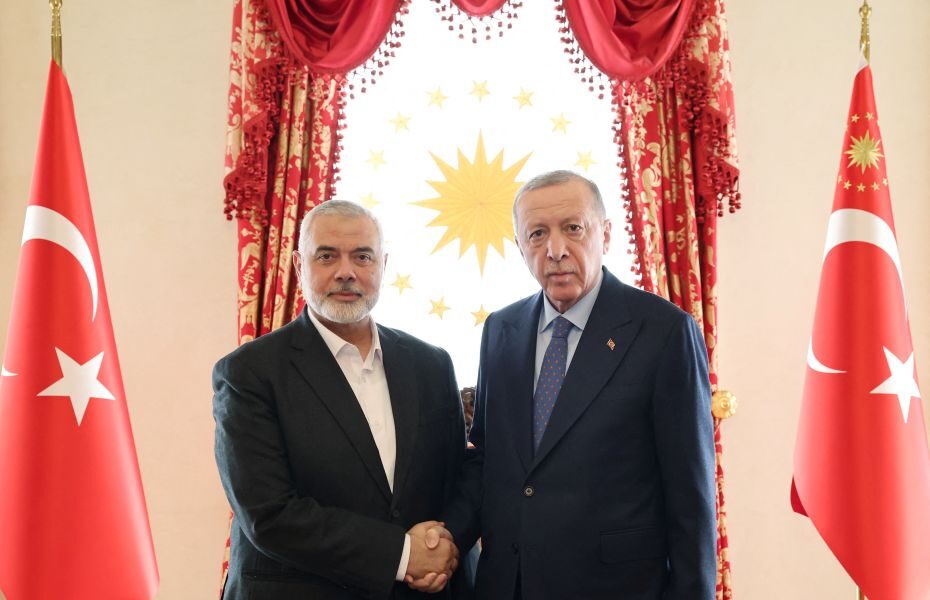Erdogan needs a reset with the US but Congress could stand in the way

Turkey is attempting the impossible by trying to reestablish a productive relationship with the US while declaring his unreserved support for Hamas, and Congress may be gearing up to push back. After suffering his greatest electoral defeat on March 31, Turkey’s Recep Tayyip Erdogan is attempting to rebuild his image with Turkish voters. His first move instituting trade restrictions on Israel. His second move has been let a flotilla, made up of charities linked to Hamas, sail towards Gaza in the hopes of eliciting a military response from Israel. Topping all this will be a scheduled meeting between Erdogan and Hamas leader Ismail Haniyeh in Istanbul. As Erdogan explained, “Turkey is a country that stands firmly behind Hamas.”
Congress should not be shocked by Erdogan’s affinity for a terrorist group that massacred 1,200 Israelis on October 7. Since 2011, the Turkish government has positioned itself as a premier patron of Hamas and provided it with material support to include offices, passports to its senior leaders, the means to raise funds, and to recruit. This is all based on Erdogan’s personal conviction that Hamas is a “resistance movement” comparable to Turkey’s revolutionary forces under Ataturk, who are fighting to liberate Palestinians. It is also reflective of Erdogan’s worldview, dominated by political Islam in the Muslim Brotherhood tradition-a cause he has championed for decades.
While Erdogan’s anti-Israel stance is ironclad, his actions show that he is not always ready to sacrifice his financial interest on behalf of the cause. After the Gaza war began, Erdogan called for a boycott of Israel, to punish it for committing “genocide” against Palestinians. Even though citizens were discouraged from supporting pro-Israel businesses, Turkish companies, to include one owned by his son, continued to trade with Israel. This duplicitous stance angered Turks and may have cost Erdogan the local elections. Caving to public pressure, Erdogan announced trade restrictions on Israel consisting of 54 products, including aluminum, fertilizer and jet fuel.
The move set off alarm bells in Congress and has a number of senators and congressman contemplating a significant response to what appears to be a next generation Arab League boycott of Israel. While Turkey has taken these measures, it is not difficult to image other countries, objecting to Israel’s conduct of the war in Gaza, to impose similar trade embargoes.
Congress and the White House can and should stand in the way of this effort, utilizing long standing laws and authorizations to punish Turkey for these politically motivated boycotts and dissuade other countries from taking similar actions. The US can begin to invoke restrictions through the use of US anti boycott laws administered through the Export Administration Act. These laws prohibit agreements by companies to refuse to do business with Israel, furnishing by companies of information about business relationships with Israel, and implementation of letters of credit that include prohibited boycott terms. The Department of Commerce can invoke these laws and send advisories to Turkish businesses and financial institutions that are in breach of contract with Israeli businesses. The Department of Treasury and the Internal Revenue Service could also deny foreign tax benefits to companies engaging in boycott activities.
Congress could also punish Turkey by utilizing the terms of the Countering America’s Adversaries Through Sanctions Act (CAATSA). The law allows for the application of sanctions against anyone involved in the defense or intelligence sector of Russia. Turkey, through its purchase of major weapon systems from Russia surely qualifies. The White House could also use authorities in Executive Order 13661 and 13662 to target Turkish individuals linked with Russia. The US has already taken limited action against Turkish firms for sanctions evasion related to Russia and could expand to larger swaths of the Turkish economy. To the extent Turkish shipping and port entities are engaged in sanctions evasion, on behalf of Russia, these entities could also be targeted under existing authorities.
On the issue of Ismail Haniyeh’s visit to Turkey, the US can impose additional penalties on any entity the provides services to him, as a designated entity and the head of the Hamas political bureau, he has been subject to restrictions since 2018. Turkish airport services, transportation assets, and anyone that facilitates his movements to and from Turkey risk having their assets frozen by OFAC.
The White House should additionally begin to get tough with Turkey in regard to drone parts and supplies being sold to Iran. Iranian drones formed a significant part of the air attack that took place against Israel on April 13. Treasury’s Office of Foreign Assets Control (OFAC) has sanctioned Turkish firms linked with Iran’s drone program. The drone program, which is supporting Russia in their war against Ukraine, appears to have Turkey selling its drone technology to both sides of the conflict. Congress could call for additional sanctions on Turkey based on this drone supply chain which appears to be benefiting Iran’s IRGC as well.
Finally, the US should also utilize its counterterrorism authorities to target Turkish vessels, as well as the insurance and communications companies that provide these vessels services, that are part of the so-called “Freedom Flotilla,” intending to sail to Gaza this month. The principal organizer “Humanitarian Relief Foundation” (IHH)” has ties to Hamas and the Muslim Brotherhood, and as a result, may be targeted for its association with a US- designated terrorist entities.
IHH’s intentions are far from benevolent. Rather than deliver aid to Gazans through established aid channels overseen by the US and Israel, the flotilla states that it will deliver the aid directly to Gaza. This would mean a breach of the US and Israeli established maritime aid corridor. It also means that the ships, without being subjected to inspection, could be carrying illicit cargo such as weapons and other dual-use materials. IHH previously attempted such a feat in 2010, leading to a military altercation with the Israeli navy.
As a NATO ally, Turkey has responsibilities which extend beyond the Erdogan’s core beliefs, augmented through frequent outbursts. Boycotts of Israel and vocal support for Hamas only limit Erdogan’s options in courting a better relationship with the US Congress sees these moves as provocation and will act to retaliate if necessary. There is a responsibility to regional security, the responsibility of countering illicit finance and sanctions evasion, along with benefits of a close defense relationship with the US If Erdogan wants a reset of the relationship with the West, he must put an end for his support to a terrorist organization with so much blood on its hands, both American and Israeli.
Sinan Ciddi is a non-resident senior fellow at the Foundation for Defense of Democracies (FDD). Tyler Stapleton is director of congressional relations at FDD Action. They both contribute to FDD’s Center on Economic and Financial Power (CEFP) and Center on Political and Military Power (CMPP).





